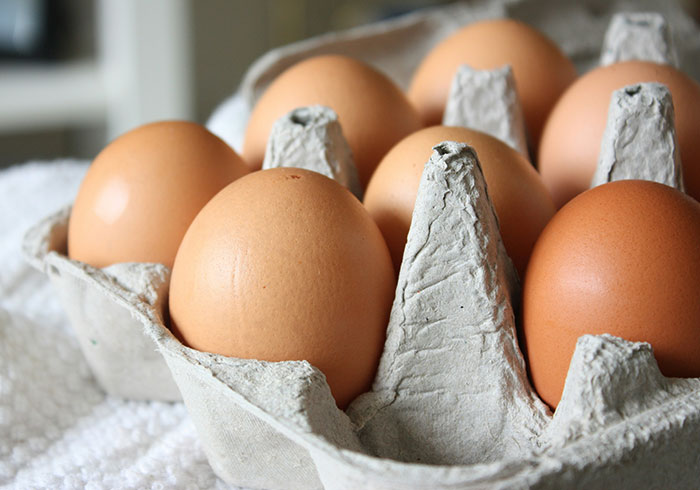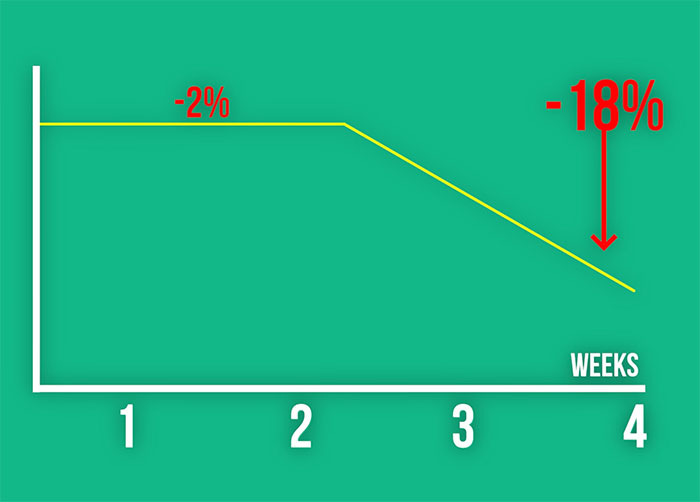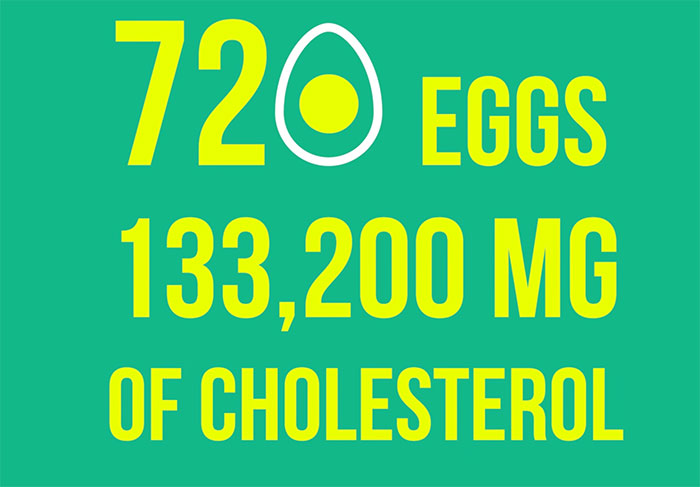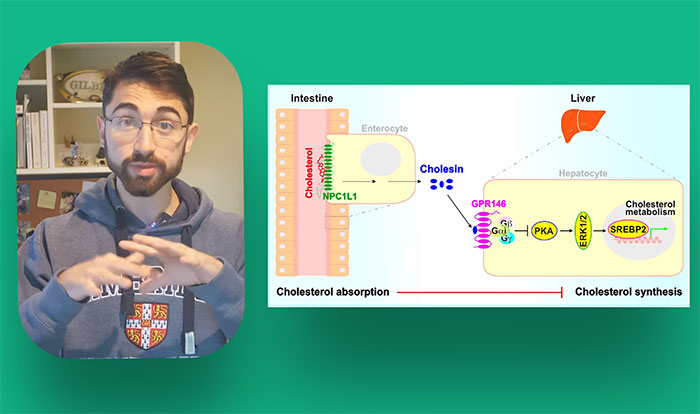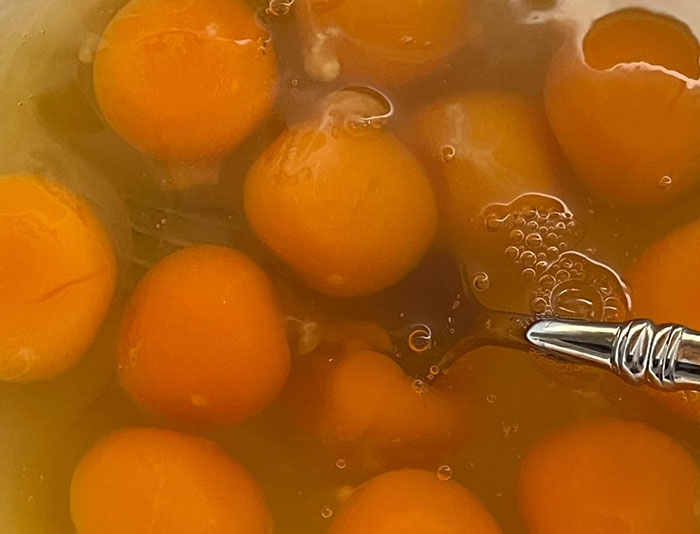Nick Norwitz, a doctorate student at Harvard University, ate the equivalent of 24 eggs per day, or over 133,000 mg of dietary cholesterol, during the month-long experiment. Taking to his YouTube page earlier this month, Dr. Norwitz revealed that following his experiment, his low-density lipoprotein (LDL) levels, otherwise known as “bad” cholesterol, fell by 18%. In the video, which has since amassed over 203,00 views, Dr. Norwitz explained: “I hypothesized that eating 720 eggs in one month, which alone amounts to 133,200mg of cholesterol, would not increase my cholesterol.
A soon-to-be medical doctor ate an astonishing total of 720 eggs
Share icon Image credits: nicknorwitz “Specifically, it would not increase my LDL cholesterol. And, indeed, it didn’t, not a smidge.” He added: “Even though my dietary intake of cholesterol more than quintupled, my LDL cholesterol actually dropped.” For years, it was commonly believed that eggs, particularly the yolk, raised cholesterol levels and increased the risk of heart disease. Share icon Image credits: Morgane Perraud (not the actual photo) This misconception stemmed from the fact that egg yolks are high in dietary cholesterol, but recent studies have shown that dietary cholesterol has only a modest effect on blood cholesterol levels for most people. According to the Harvard T.H. Chan School of Public Health, saturated and trans fats play a much larger role in raising blood cholesterol than eggs. In fact, a 2020 meta-analysis published in the BMJ found no significant link between moderate egg consumption and heart disease in healthy individuals.
He ate the eggs over the course of just one month and shared what happened to his body
Share icon Image credits: Nick Norwitz Nevertheless, Dr. Norwitz wanted to end the egg debate for good, consuming roughly one egg every hour. As part of his challenge, he also shared his diet plan online and included a photo showing over 40 egg cartons he had stockpiled throughout the process. Dr. Norwitz didn’t, however, state what other foods he ate to accompany the unique experiment. Additionally, his results may not be definitive, as scientific research requires a larger sample size to ensure accuracy and reliability. Share icon Image credits: Nick Norwitz Testing on just one person doesn’t account for variations in genetics, metabolism, or lifestyle factors that could significantly impact the outcome of such a diet. Moreover, Dr. Norwitz added 60 grams of carbohydrates to his daily intake, focusing on fruits like bananas, blueberries, and frozen cherries, often dipping them in macadamia butter. The YouTuber also wanted to prove that adding carbs back into the diet of the “lean, mass hyper respondents” could lower the LDL levels.
The results defied common beliefs about eggs, especially the yolk
Share icon Image credits: Nick Norwitz Share icon Image credits: Nick Norwitz A study found that for those with health issues, including diabetes, eating 6-12 eggs per week didn’t have a negative effect on the total blood cholesterol levels or heart disease risk factors, but it increased high-density lipoprotein (HDL) cholesterol or the “good” cholesterol. According to the study, when someone eats foods with cholesterol, it sticks to certain spots in the gut. This makes the body release a hormone called Choleson, which then sends a signal to the liver. This signal tells the liver to slow down making its own cholesterol and helps the body keep things in balance.
You can watch Dr. Nick Norwitz’s YouTube video below:
Share icon Image credits: nicknorwitz “In lean, insulin-sensitive people who go on low carbohydrate diets, especially ketogenic diets, it’s common for LDL levels to rise as part of a lipid triad,” Dr. Norwitz explained. Consequently, adding carbs back into the diet of the “lean, mass hyper respondents” can lower the LDL. Dr. Norwitz subsequently ate 60 grams of carbs per day in the form of fruits, such as blueberries, bananas, and strawberries, in the final two weeks of his experiment. Dr. Norwitz consumed around two bananas or 21 ounces (approximately 595 grams) of blueberries each day.
There’s a misconception that eggs negatively affect cholesterol levels and cause heart problems
Share icon Image credits: nicknorwitz According to the content creator, this led to the now-viral dramatic drop in “bad” cholesterol. However, 60 grams of net carbs per day weren’t enough to reverse his “lean, mass hyper responder phenotype.” But it did have a significant enough effect to “ebb and flow out” of ketosis, as Dr. Norwitz said: “The extra dose of carbs dominated over the insane amounts of cholesterol I was consuming,” Cholesterol is categorized into two main types: LDL (low-density lipoprotein) and HDL (high-density lipoprotein).
A post shared by Nick Norwitz (@nicknorwitz)
Nick Norwitz, a doctorate student at Harvard University, ate the equivalent of 24 eggs per day
A post shared by Nick Norwitz (@nicknorwitz) LDL is often called “bad” cholesterol because high levels of it can lead to plaque buildup in your arteries, increasing the risk of heart disease and stroke, the CDC and Heart.org explain. On the other hand, HDL is referred to as “good” cholesterol because it helps remove LDL from the bloodstream by carrying it to the liver for breakdown and removal from the body. Maintaining a balance of low LDL and high HDL levels is essential for reducing the risk of cardiovascular problems.
“Eggs have always been the bad guy,” a reader commented
Share icon Share icon Share icon Share icon Share icon Share icon Share icon Share icon Share icon Share icon Share icon Share icon Anyone can write on Bored Panda. Start writing! Follow Bored Panda on Google News! Follow us on Flipboard.com/@boredpanda!

